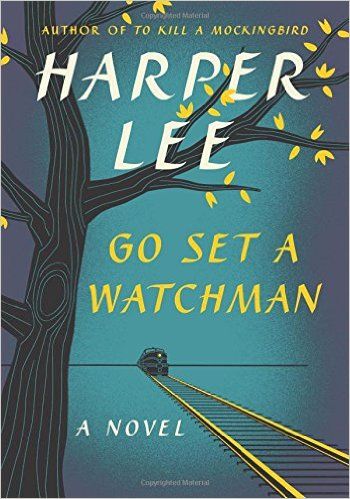WASHINGTON — No one is wearing a Boo Radley costume, and everyone is nervous. Will they remember this night as the moment they were there or the moment that ruined it all? Their childhoods, their choice of professions, their visions of right and wrong — it all seems to hang on the pages of “Go Set a Watchman.”
A dozen people are camped in front of the register at Kramerbooks, the only place in Washington where they can assuage their anxiety at the earliest possible moment: midnight on the release day of Harper Lee’s “new” book. The book, the small crowd knows, isn’t new at all. The author they love penned it 60-some years ago, when the story of Atticus, Scout, Jem, Calpurnia and Boo was just forming in her mind.
And that is exactly the problem.
An article on the cashier’s screen is headlined “Harper Lee’s ‘Watchman’ Is a Mess That Makes Us Reconsider a Masterpiece.” It echoes everything they’ve read in the four days since the first chapter of “Watchman” was published and the reviews began pouring out.
“The depiction of Atticus in ‘Watchman’ makes for disturbing reading, and for ‘Mockingbird’ fans, it’s especially disorienting,” The New York Times wrote. One of People Magazine’s four reasons to read the book was “It Shows You How Valuable an Editor Can Be.” The pages about to be in their hands would tell them Atticus Finch — pillar of all that is good in the original novel — attends a Ku Klux Klan meeting and argues in favor of segregation. Jem dies. Scout never marries Dill. And Boo Radley? What is going to happen to Boo Radley?
“I don’t know if I can handle it,” says Amy Gwiazdowski, a neighborhood regular. “I might just buy it and let it sit for a while.”
“I wish there were people here dressed as Scout or something,” says another customer, Caitlin Clements. She admits the characters’ appearances are less distinctive than, say, a wizard costume, but what if this low-key release is just the first in an evening of disappointment?
Maybe everything wouldn’t be so dramatic if “To Kill a Mockingbird” didn’t represent so much. Not the Pulitzer Prize or the Oscar-winning film or the ninth-grade lesson on bildungsroman. But race and rights, courage and conviction, justice and justness — Harper Lee explained the world to these people, and ever since, they tried to see it through her eyes.
“I went to law school because of Atticus Finch,” says Mary Owens as she waits in line. She almost has Atticus’ quote memorized: “There is one human institution that makes a pauper the equal of a Rockefeller, the stupid man equal of an Einstein, and an ignorant man equal of any college president. That institution, gentlemen, is a court.”
Owens read those words in high school, and soon was off to study in Mobile, Alabama, less than 100 miles from the town where Atticus would be if he were real. Now she is an attorney working at the U.S. Interagency Council on Homelessness.
An employee begins vacuuming the bookstore.
“You know, the New York Times review came out the same day the Confederate flag came down,” says customer Sheila Madhani, “It mentioned the quote that says you have to stand in a man’s shoes to understand him.” South Carolina Governor Nikki Haley’s speech against the flag, Madhani points out, “said the same thing.”
As the minutes tick down, the “Mockingbird” loyalists stray from the line to flip through the stacks of books all around. Somewhere there sit the books that more recently became their own phenomenons: the seven Harry Potters by J.K. Rowling, master of the midnight release, who regularly sets her fans in a frenzy by releasing previously-untold bits of the story on her website. “Fifty Shades of Grey” from E.L. James, who re-wrote her book from a different character’s point of view at her fans’ request. “The Fault in Our Stars,” the book by young adult novelist John Green, who shared his blunt take on what happens to his characters: “They all ceased to exist the moment the novel ended,” he wrote.
That’s where the legacy of “To Kill a Mockingbird” hangs in the balance. If “Watchman” is read like a Harry Potter sequel, then the truth is that the virtuous Atticus Finch becomes a bigot. If “Watchman” is viewed like a mere first draft of ideas Lee would later dispose, as a Washington Post investigation seemed to prove, then Atticus can exist forever as the man they’ve known.
“I guess it all depends on if I’m disappointed,” says Paul Pecorale, the first person in line.
11:59 p.m. Pecorale’s son Aidan stares at a cell phone, watching the seconds go by on a clock app. Aidan read “Mockingbird” last year in eighth grade. He really liked Boo, he says, but overall he felt his teacher took too long getting through it.
The cashier reaches for the box with a bright orange sticker that says “DO NOT SELL OR DISPLAY BEFORE Tuesday, July 14, 2015 STRICTLY ENFORCED” with a phone number for reporting violations.
“5 seconds!” Aidan yells.
“OK, midnight.”
Pecorale pays $29.60 with a card and heads for the door with his sons and a plan.
If “Go Set a Watchman” is a letdown, he’ll pick up “the real deal” instead. It’s been years since he read “Mockingbird,” anyway.



